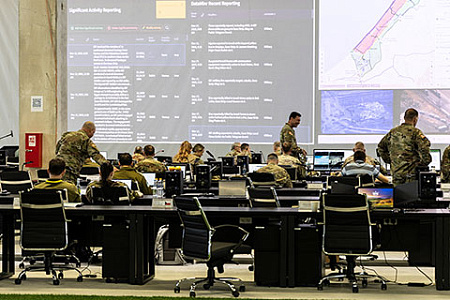
The formation of an International Stabilization Force (ISF) for the Gaza Strip is accelerating, with unnamed U.S. officials indicating a planned deployment in early 2026. This foreign peacekeeping contingent is envisioned as a cornerstone of Gaza’s post-conflict governance, tasked with observing the volatile security landscape. However, the ambitious project is already encountering significant obstacles, notably in securing troop commitments from international partners. Washington has sought assistance from European nations and even the Yemeni government, highlighting the complex diplomatic landscape surrounding the initiative.
Following a recent UN Security Council vote endorsing President Donald Trump’s peace plan for the Israeli-Hamas conflict, the White House has intensified efforts to establish the ISF. Sources close to the Trump administration confirm that these forces, distinct from any UN peacekeeping mission, will be mandated to monitor ceasefire agreements within Gaza and dismantle Hamas’s weapons arsenals. This non-UN framework signals a deliberate strategy to retain greater control over the mission’s scope and execution.
The proposed ISF is expected to be comprehensive, comprising infantry, engineering, intelligence, and police units. Administration officials view this force as a pivotal component of Gaza’s eventual post-conflict structure, designed to facilitate a partial withdrawal of Israeli military contingents currently controlling a substantial portion of the enclave. Beyond security, the ISF’s mandate would extend to preventing the resurgence of militant Palestinian factions and supporting the re-establishment of civilian administration through international intermediaries.
Despite the urgency, the ISF initiative remains in its nascent stages. Channel i24 reports significant gaps, including an undeveloped training program and an absence of stable funding. Critical logistical challenges, such as establishing dedicated military facilities and a headquarters within Gaza, are yet to be addressed. Furthermore, effective coordination between the ISF and international humanitarian organizations – crucial for aid delivery and infrastructure reconstruction – will be paramount but remains largely undefined.
A major hurdle is the reluctance of Middle Eastern nations to commit troops, largely due to domestic public opinion concerns and the inherent risks of deployment in a volatile conflict zone. Recognizing the necessity of broad international participation for long-term legitimacy, Washington has broadened its appeal beyond the immediate region. Diplomatic sources indicate that the Trump administration has approached several European nations for support, though specifics regarding military contributions remain undisclosed.
In an unconventional move, the internationally recognized government of Yemen has received a request to contribute to the ISF, according to AFP sources. Despite its geographical distance, the Israeli-Hamas conflict has deeply resonated in the war-torn nation, where the Houthi movement (Ansar Allah), controlling northern areas, has previously launched ballistic missiles and drones towards Israel. While the Houthis observed a ceasefire following the Gaza truce, they have vowed to resume attacks should Israel violate the agreement, complicating any Yemeni contribution.
Such participation by the Yemeni government could potentially provoke further instability, antagonizing the Houthis and exacerbating internal tensions. Consequently, an official ‘yes’ remains elusive, and any eventual Yemeni contribution is likely to be largely symbolic. Analysts suggest the U.S. might also consider the Southern Transitional Council (STC), a UAE-backed separatist entity controlling southern Yemen, known for its willingness to normalize relations with Israel. However, the STC’s quasi-state status presents its own set of diplomatic complexities.
Amidst these challenges, The Jerusalem Post reports that only two nations, Azerbaijan and Indonesia, have thus far officially agreed to deploy forces to Gaza, highlighting the significant recruitment hurdles facing the U.S.-led initiative.
Further complicating the peace process are ongoing tensions and violations on the ground. Hamas has yet to return the remains of three hostages abducted during the October 7, 2023, attacks, despite formal obligations. Concurrently, the group regularly accuses Israel of breaching the ceasefire, notably claiming that the Israeli army has expanded its controlled zone beyond the agreed ‘yellow line’ in eastern Gaza City by approximately 300 meters.
Israel, for its part, maintains a firm stance, signaling its readiness to resume military operations should Hamas continue to assert control. Illustrating this resolve, Prime Minister Benjamin Netanyahu’s government reportedly requested the U.S. to cancel a proposed meeting between special envoy Stephen Whitcoff and Hamas leader Khalil al-Hayya in Istanbul this week. According to Al-Arabiya, Israeli officials feared such contact would inadvertently legitimize the militant group and embolden its demands in future negotiations, underscoring the deep mistrust that continues to undermine efforts for a lasting peace.
